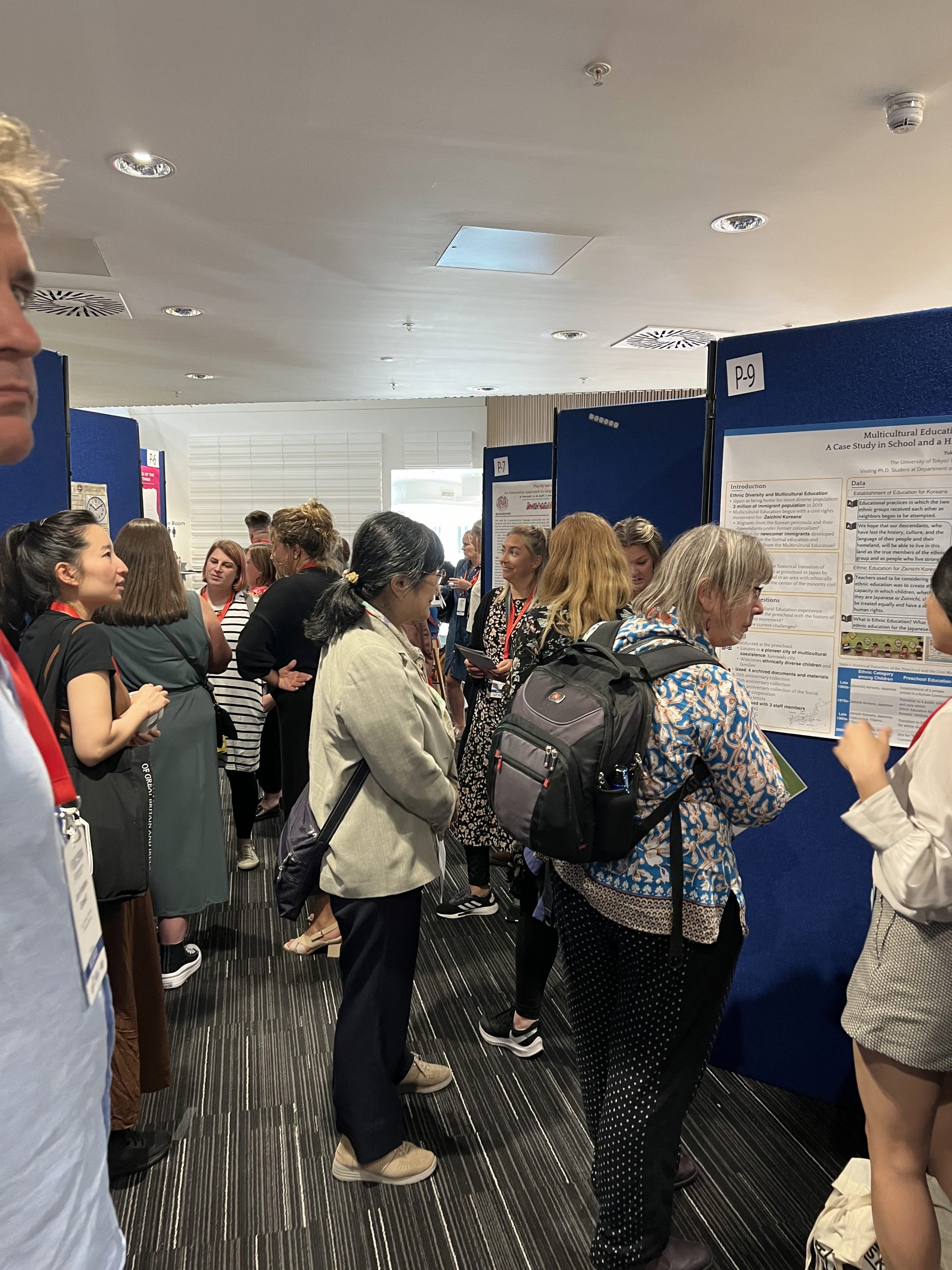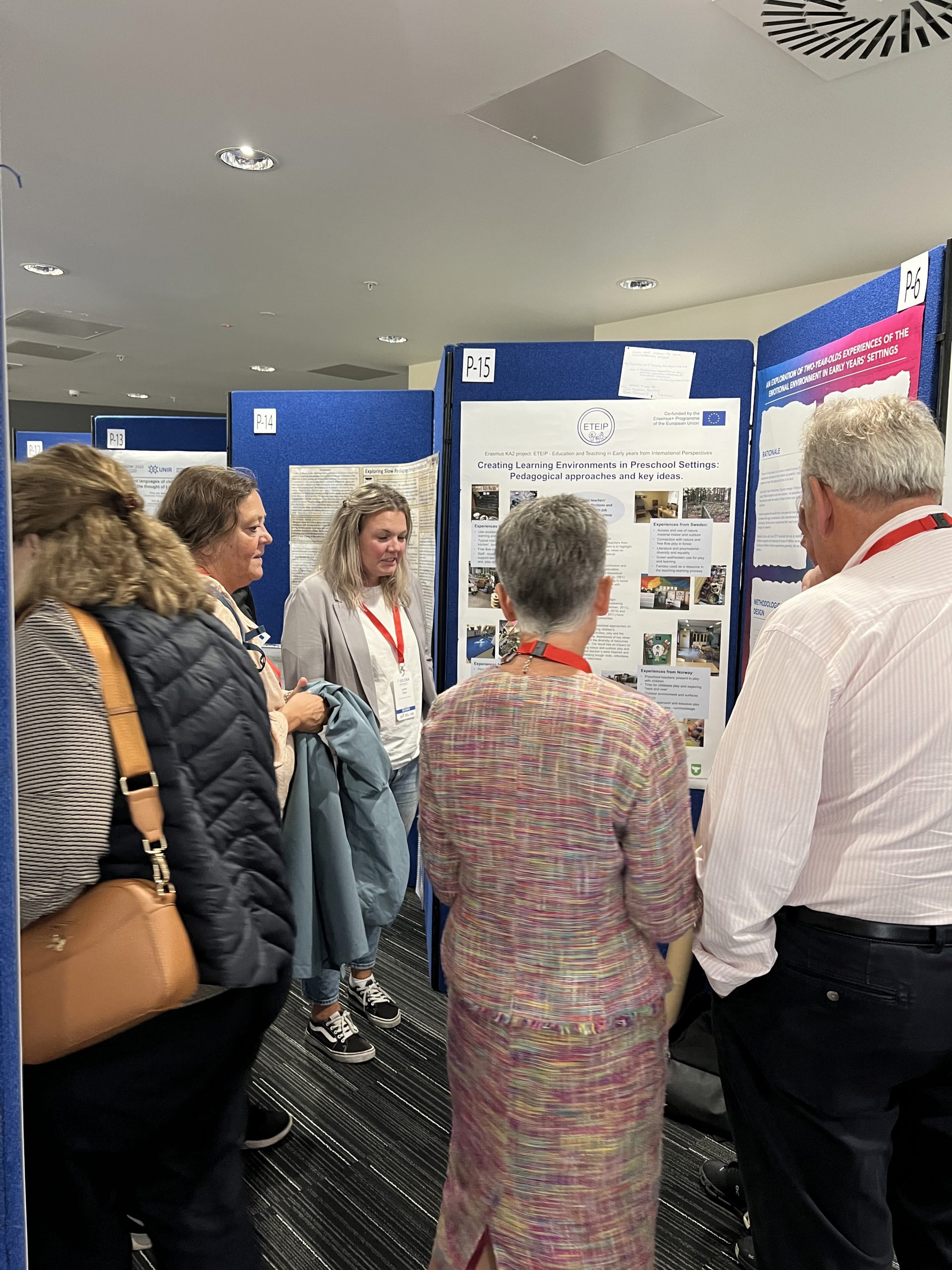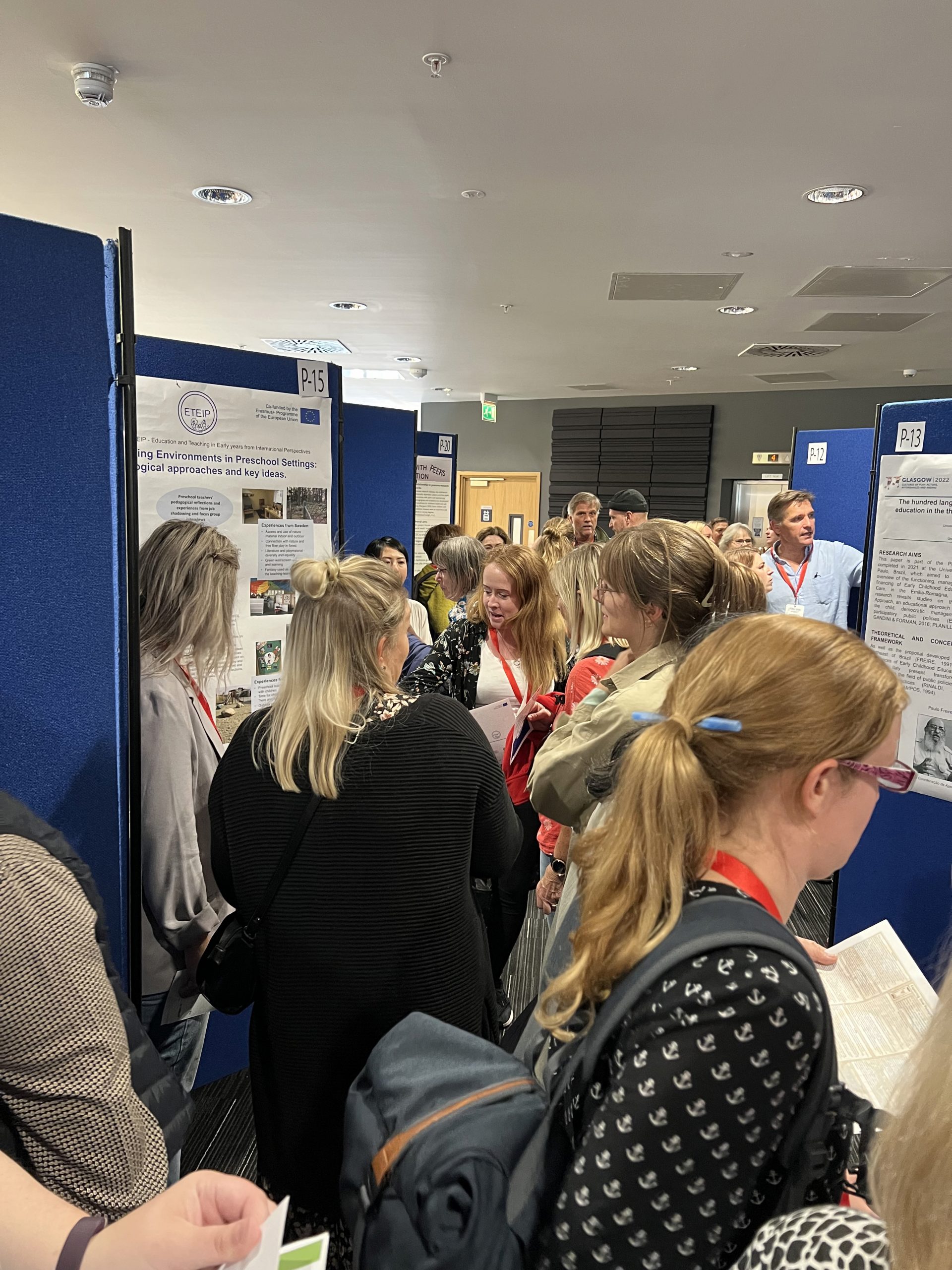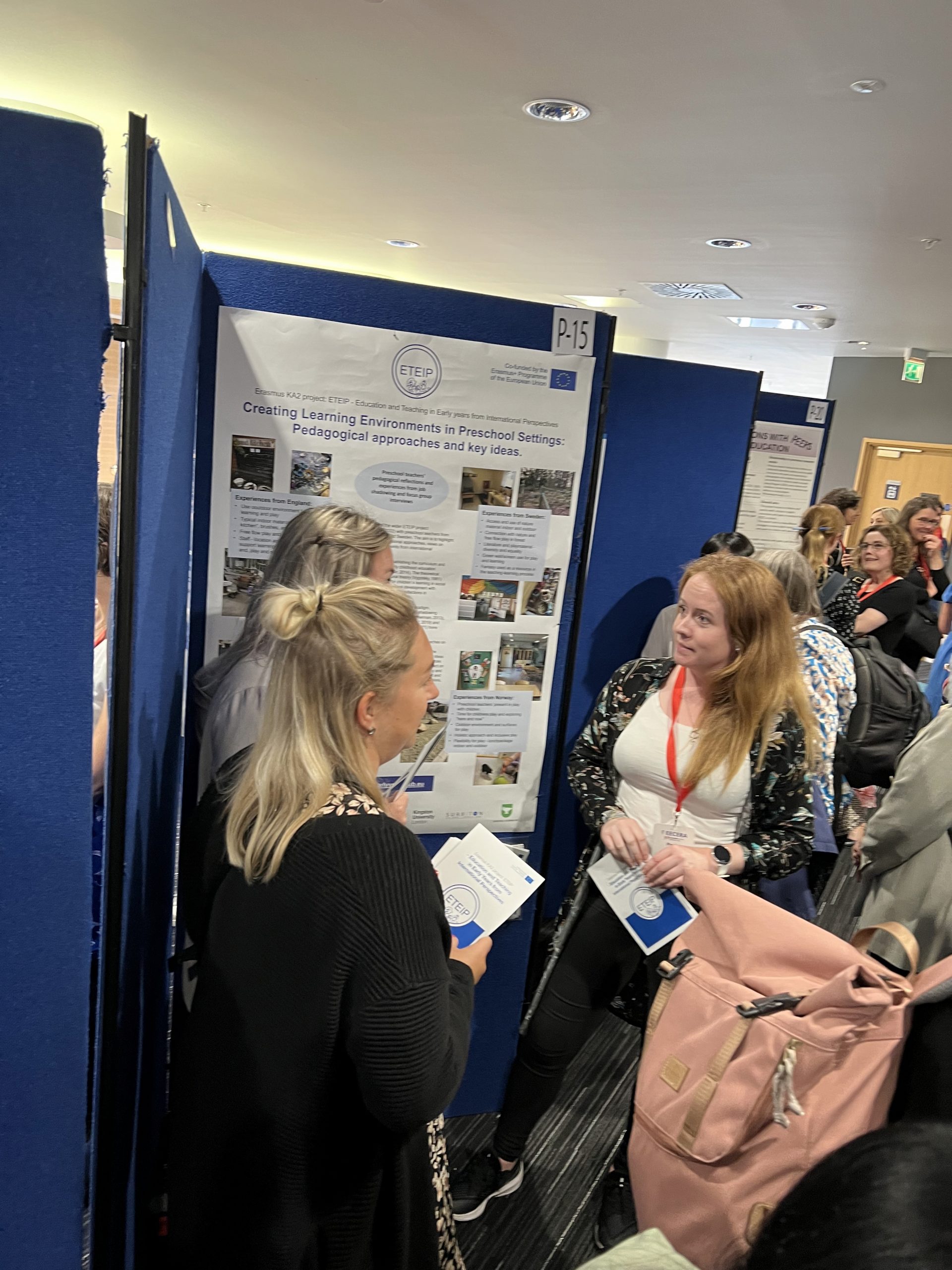International presentations
EECERA conference, Glasgow
24th of august to 26 of august 2022
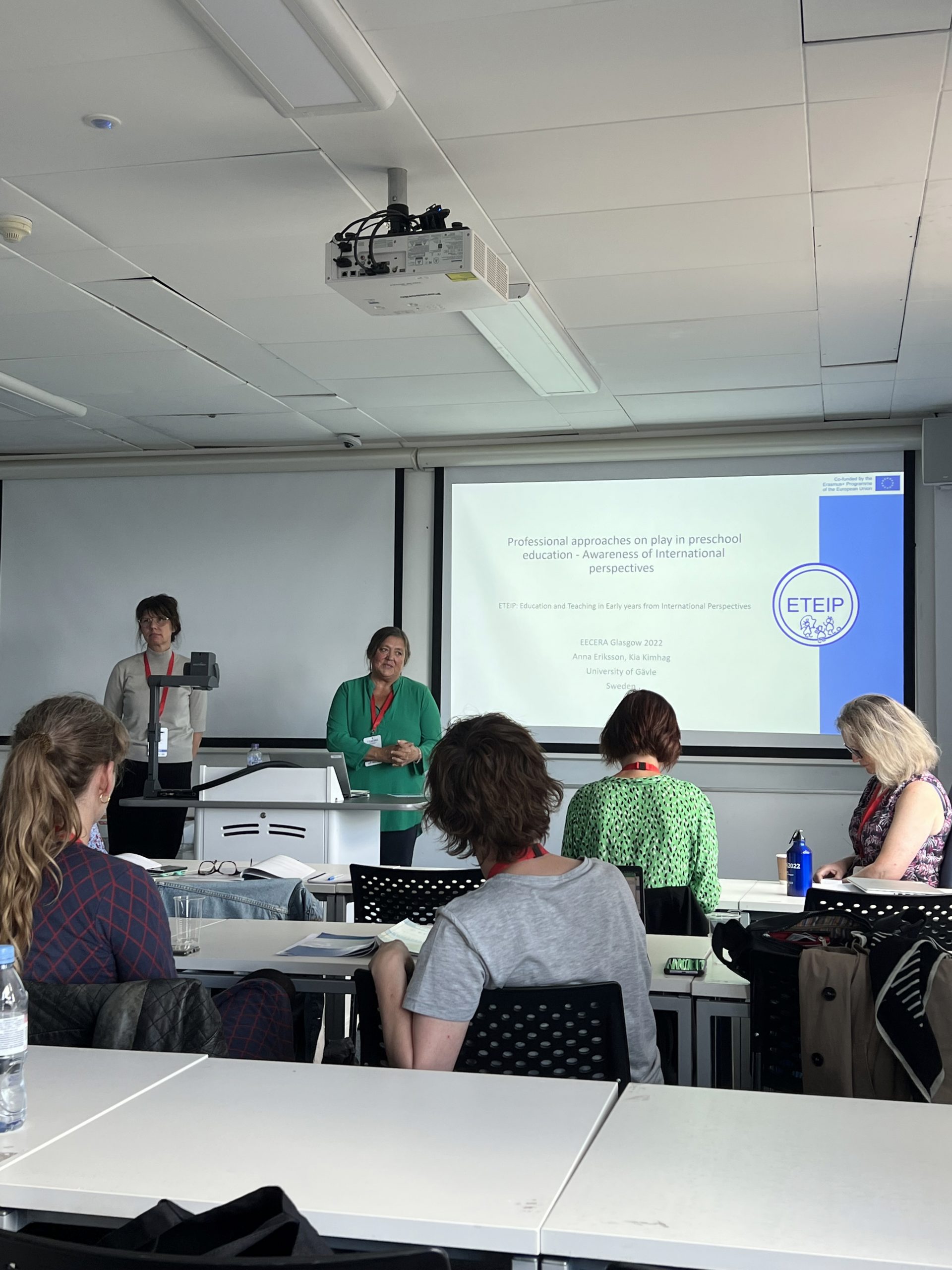
Paper presentation
Professional approaches on play in preschool education – Awareness of International perspectives
Abstract
This ongoing ERASMUS+project involves preschool teachers from England, Norway, Spain, and Sweden. The study aims to highlight teacher’s professional awareness related to pedagogies in teaching, ethos, and values from international perspectives. Focus on play as a part of education in the preschool. Play is a key resource for establishing the curriculum and approaches to teaching in early childhood education (e.g. Fleer, 2010; Gunnarsdottir, 2014). The theoretical frame derives from sociocultural theory (Vygotsky, 1981) emphasizing play as crucial for children´s learning in social settings. Theory about professional development with openness, shared experiences, and reflections in communities of practice (Wenger, 2013). Action research paradigm (Kemmis, 2010) including job shadowing, preschool manuals, reflection questionnaires, photos and focus group interviews (Salo & Rönnerman, 2013), collaborative reflections (Schön, 1983; Pollard, 2019) and case study (e. g. Cohen, Manion & Morrison, 2011) are being used as the main methodology approaches. Each partner country´s ethical guidance (GDPR) has followed with informed consent from participants, partner agreement by EYE with identities anonymized, no photos or filming children only environments. Professional approaches on creating learning environments for play includes children’s perspective, teacher’s awareness of different pedagogical strategies in play inspired by different settings environment and available materials indoor and outdoor. Reflections show similarities and differences regarding the importance of children’s possibilities to be more active without relying on teacher’s activities. The results show the importance of teacher’s role when creating learning environment for play. The findings suggest implications in developing learning environment through different key ideas and changes.
Keywords
children’s perspective, early years educators, international perspectives, play, professional approaches
Paper presentation
Education and Teaching in Early Years from International Perspectives (ETEIP) Project – Being a Reflective Early Years Educator (EYE) Manual for Mobility Visits.
Abstract
This two-year ETEIP project aims to support Early Years Educators’ (EYE) use of reflection to improve professional practice and ECEC provision through exploration of international perspectives while on mobility visits and job-shadowing experiences in England, Norway, Spain, and Sweden. Project uses reflective theories and models of Schön (1983), Pollard (2019), Brookfield (2017), Moon (2007) to recognise how reflection can develop ‘professional thinking’ challenging EYE educational assumptions, pedagogical approaches and comparing ECEC provision to improve practice. Conceptual framework draws upon Dewey (1933), Schön (1983) and Pollard (2019) use of developing ‘professional-thinking’ to challenge EYE ‘routine-actions’ in practice. Engagement in shared reflection of the experiences challenges assumptions and provides alternative perspectives from which to develop new strategies (Brookfield, 2017). Project used a qualitative interpretative paradigm with a case study (Cohen, Manion & Morrison, 2011) evaluative approach. 2 focus groups were undertaken at the end of each mobility visits (4) with 16 EYE. Construct categories for coding are being used to identify key themes (Cohen, Manion & Morrison, 2011). Evaluative approach used for project, ethical guidance BERA (2018) adhered to with informed consent given by EYE with identities anonymised. Preliminary findings identify that the use of reflection during the mobility visits has challenged EYE assumptions and perspectives of practice, enabling identification of strategies for improvement. The use of reflection within the project provides EYE with a framework from which to share experience and explore international perspectives. The reflective materials/tools produced support EYE reflection into their provision and practice creating new possibilities and perspectives.
Keywords
Reflection, International Perspectives, Improving Practice, Collaborative Development of Practice, Shared Reflective Dialogue
Paper presentation
Creating Learning Environments in Preschool Settings: Pedagogical approaches and key ideas.
Abstract
This study is a part of the wider ETEIP project (Erasmus+KA2, 2019-2022) with preschool teachers from England, Norway, Spain, and Sweden. The aim is to highlight preschool teachers’ professional approaches, views on creating learning environments from international perspectives. Play is a key resource for establishing the curriculum and approaches to teaching in early childhood education (e.g. Fleer, 2010; Gunnarsdottir, 2014). The theoretical frame derives from sociocultural theory (Vygotsky, 1981) emphasizing play as crucial for children´s learning in social settings. Theory about professional development with openness, shared experiences, and reflections in communities of practice (Wenger, 2013). Action research paradigm (Kemmis, 2010) through job shadowing including focus group interviews (Salo & Rönnerman, 2013), collaborative reflections (Schön, 1983; Pollard, 2019) and case study (e. g. Cohen, Manion & Morrison, 2011) are being used as the main methodology approaches. Each partner country´s ethical guidance (GDPR) has followed with informed consent from participants, partner agreement by EYE with identities anonymized, no photos or filming children only environments. Professional approaches on creating learning environments include children’s perspective, realization of learning activities, play and the importance of teacher’s different role. Awareness of key ideas to develop own settings inspired of the diversity of resources and materials indoor and outdoor. Teaching strategies suggest that children can learn more autonomously without relying on teachers to organize learning activities. The result has an impact on new opportunities for developing indoor and outdoor play and learning environment. The findings suggest implications in developing learning environment through key ideas and changes.
Keywords
Early years setting, international perspective, learning environment, play, professional approaches

